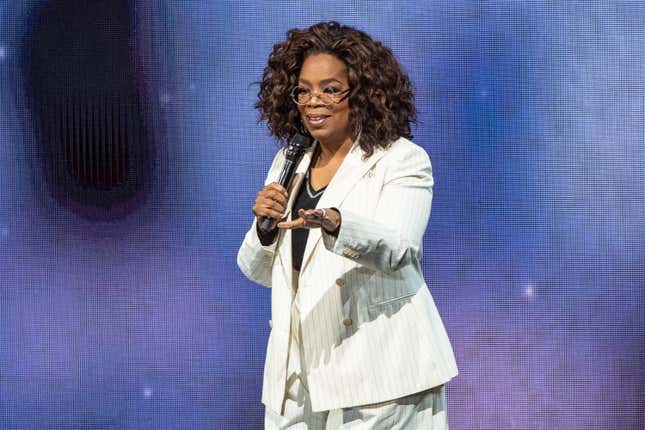
On Tuesday, members of the press participated in a Zoom roundtable conference with journalist, mogul and philanthropist Oprah Winfrey, Tennessee State University President Dr. Glenda Glover, and Bishop Joseph Warren Walker III of Mount Zion Baptist Church in Nashville, Tenn., to discuss her latest COVID-19 relief donation through the Oprah Winfrey Charitable Foundation. Initially, Winfrey had planned to donate $10 million towards COVID-19 relief to communities across the country, but she recently bumped the relief fund’s donation total to $12 million.
The grants are supporting organizations in cities that Winfrey has “called home” throughout her life and career: Nashville, Chicago, Milwaukee, Baltimore and Kosciusko, Miss. Each city is doing its part to help underserved communities experiencing the devastating, disproportionate impact of the pandemic.
“These organizations are working tirelessly on the ground to help those hit the hardest by the pandemic, meeting people where they are and serving in ways needed most,” Winfrey said in a statement.
The funds will support a myriad of causes from the areas, such as Live Healthy Chicago, which aims to provide thousands of families in minority communities with access to wellness visits, contact tracing, care packages and long term recovery efforts. As well as the Nia Imani Family, Inc., a Milwaukee-based nonprofit agency that provides housing for young, pregnant or first-time mothers. Many of these women are recovering from homelessness, violence, and traumatic life experiences.
Tuesday’s conference pertained to Oprah’s $2 million donation to support the launch of NashvilleNurtures, a collaboration between Mt. Zion Baptist Church and her alma mater, Tennessee State University, which incorporates help from the Nashville Pastors Coalition and key organizations in the city. Her donation will provide immediate food relief to over 10,000 families in need within Nashville and the surrounding areas.
Winfrey lived in Nashville with her father during her high school and college years and got her start in the broadcast industry there as well, first with the radio station WVOL, and then with the now WTVF-TV network, where (at just 19 years old) she became the first African American woman to work as their news anchor.
She personally enlisted Nashville-area pastors from 10 churches—Mount Zion, Friendship Baptist Church, New Covenant Christian Church, Faith United Baptist Church, Watson Grove Baptist Church, Temple Baptist Church, Berean Baptist Church, Lee Chapel A.M.E., and Lake Providence Baptist Church—to help decipher exactly what could be done to help those in need.
“During this pandemic, what I recognized is, sometimes, people just need a piece of fish,” Winfrey says. “So, to be able to offer that to people [at] this moment...Bishop [Walker] and all the pastors were in agreement that the immediate need is getting food into the homes of families.”
Through the NashvilleNurtures website or its phone bank, thousands applied to receive a $200 grocery gift card for use at any Nashville-area Kroger, a market that Bishop Walker explains has been integral and beneficial for black and brown Nashville citizens who live in food-insecure areas.

“What we have done here is established going to the community specifically,” Winfrey tells The Root of the fund’s enlistment of Kroger—a company she’s worked with in the past—to help those who need it most. “That’s what I loved about this cooperative, is that we were able to work together.”
Over the course of two weeks, NashvilleNurtures reached out to thousands of citizens including single heads of households, those who experienced job losses and pay cuts, essential workers, and those caring for relatives stricken with COVID-19 in order to delegate who would receive assistance. The response to the initial 5,000 gift cards was incredibly well-received. According to NashvilleNurtures’ data, 81 percent of card recipients were female, 19 percent were male, and 15 percent chose “other” as their gender. The majority of those who received the card were aged 50 and under; 35 percent were from 18 to 35, and 32 percent were 36 to 50.
“Nashville truly was in a place where it needed some hope...it became very clear to us with persons receiving the cards that they were overjoyed,” Bishop Walker states. “We were inundated with emails, people were already posting [statements of gratitude] on social media...It was interesting because we really didn’t understand the depth of the need. We had a sense of it, but in terms of the human stories...this was the thing that really gave them hope and really inspired other people in the community.”
“We express our sincerest thanks to Ms. Winfrey for her generosity and caring for her home city of Nashville in this manner, and for including TSU to be a part of this monumental humanitarian effort,” Dr. Glover, President of TSU, International President of Alpha Kappa Alpha Sorority, and a former classmate of Winfrey’s during her time at the institution, said in a statement. “We are honored to be able to help support Nashville and to ensure that families have the food and basic necessities they need during this difficult time.”
Winfrey also offered her thoughts on how to get others to care about those who need it most during these trying times. She used the analogy of citizens being children sent to their bedrooms in order to think about what transpired.
“[A lot of people] went to their rooms, were playing and didn’t get [the urgency of the moment],” she says. “What really frightens me is that you’re going to have to get another lesson and another timeout before you can see it. That it’s going to have to hit your family, your neighbors, your community before you can see it. I don’t spend a lot of energy worried about ‘How do I get other people to do?’ I just focus on, okay, what can I do? And I think the message for this story for me is asking other people, ‘Okay, this is what I could do, this is my tithe for right now. What is yours?’”

